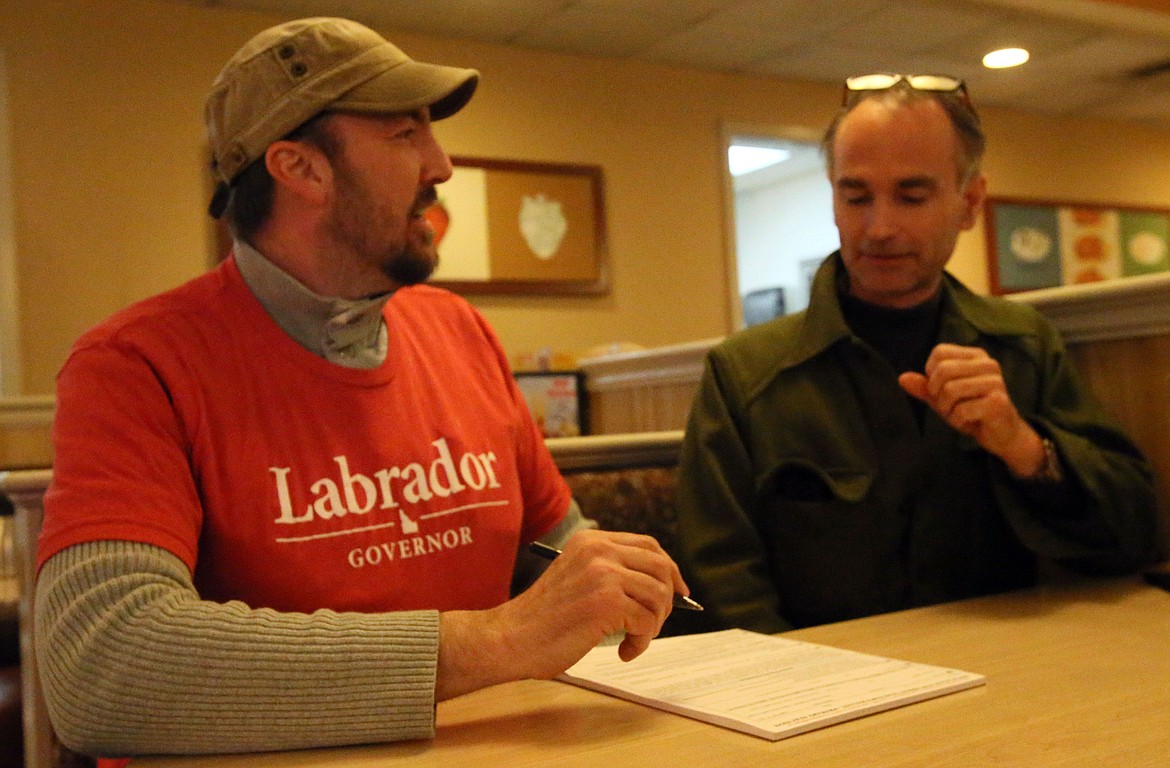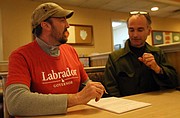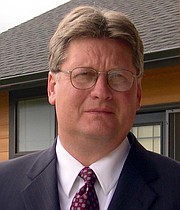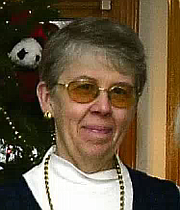Outsiders and centrists all Where do you fit in the political puzzle?
COEUR d’ALENE — They are liberals and conservatives, Trump haters and Trump supporters, Bernie Bros and Ron Paulers, so-called “RINOs” and “wackadoodles.” They couldn’t be more different politically. Yet these four local political activists interviewed by The Press have some surprising things in common.
They have deeply held values and desire to do good for their fellow man. They all see themselves as logical. While being idealistic, they are all politically pragmatic. All expressed a willingness to compromise to achieve their goals incrementally. They all can point to a moment when they came to believe that their most deeply held beliefs required them to take political action. And they have all experienced the pain of being outcast and vilified by those who struggle toward opposing political goals.
- • •
Paula Neils, chairman of the Kootenai County Democratic Central Committee, got involved in politics late in life. Neils said that for a long time, her commitments to her family and job seemed to preclude political action. The Saturday Night Massacre of Oct. 20, 1973, changed all that.
On that Saturday, President Richard Nixon ordered Attorney General Elliott Richardson to fire independent special prosecutor Archibald Cox, who was investigating the Watergate burglary. The attorney general and his deputy each refused and resigned. Eventually, Solicitor General Robert Bork fired Cox, an action ruled illegal by a federal judge several weeks later.
Her values as a Unitarian Universalist motivated Neils to take local action. In her mind, the best thing to do was to work to get people elected who supported her democratic, human rights-based values.
“I’ve always considered myself a rather extreme liberal,” said Neils, who supported Bernie Sanders in the 2016 Democratic primaries. However, she said she wholeheartedly worked for Hillary Clinton once she became the party’s presidential nominee.
Neils said she’s willing to take harder positions on issues like minimum wage because of Idaho’s political bent. No Democrat holds statewide or federal office in Idaho. Why not ask for a $15 per hour minimum wage, she asked?
“In Idaho I think, ‘What do we have to lose anyway?’” Neils said.
At the same time, as a grandmother who now sees younger Democrats coming into the party, she and the other older members have to remind them of the paths the party has trod before. It’s pointless to try what didn’t work before, she explained. She understands the emotional toll that political action, and seeming failure, can take.
“It’s hard to just keep working and working,” she said. “Things happen little by little.”
Neils related the story of Democratic friends who have given up and moved away from Idaho because it seems so implacably conservative. She said one friend’s suicide years ago was motivated in part by despair over politics. But Neils bases her action on a simple mantra: Take a breath.
“Take a deep breath and realize that the only place you really have is to start with yourself and set a good example for those around you,” she said, adding: “I do the best I can, but I’m certainly not perfect.”
- • •
The path to political activism for Sandpoint native Alicia Abbott started as a youngster who paid attention after 9/11 happened.
“I realized a lot of our wars were fought for bogus reasons,” she said. Abbott was raised a Democrat but self-consciously chose to become the family’s black sheep by joining the Green Party. She said she was drawn to the Greens because of their less-bellicose-than-the-Democrats defense policy and their refusal to take funds from corporations and political action committees.
“They want to spend at home before spending on defense, have conversations of compromise and understanding instead of wars with bombs,” Abbott said.
She challenged her parents when they supported Hillary Clinton in 2016.
“I really had to ask them how they could vote for someone who was taking that amount of corporate donations and wasn’t being transparent,” she said.
Voting for Clinton boiled down to the choice between what they saw as the lesser of two evils, said Abbott. For a decade now, she has instead chosen neither.
“It’s not going to get better if I continue to vote for the lesser of two evils,” Abbott said.
She has worked in the building industry in Sandpoint for the last eight years and, until recently, largely kept her politics to herself. People assumed that she was a “moderate conservative” because of her job, said Abbott. She chose to remain acceptably non-political in public so as to not endanger her business life, she added.
“Sometimes I feel I take risks being outspoken as a business owner,” Abbott conceded.
Abbott said she doesn’t see herself as a stereotypical tree-hugger, and has had good experiences talking about progressive politics while attired as a building industry professional. She said now that she’s been doing public activism for the Green Party, she faces a different set of incorrect assumptions, such as that she opposes vaccinations and supports unilateral disarmament.
There are only a handful of Green Party members in the area, she explained. By default, then, she constantly rubs shoulders with Democrats while doing activism, such as collecting petition signatures in Coeur d’Alene to expand Medicaid. She has had to learn how to handle pushback from fellow liberals.
“I’ve learned not to be as frustrated,” she said, though she does still feel the emotion. “The people working alongside me want the same things I do, and I keep telling myself that.”
When dogged by painful criticism, Abbott finds solace in science, math, and logic. She remembers that her critics aren’t that different from her. Abbott admitted she found it funny that she can’t get her Democrat friends to sign her petition to get the Green Party ballot access in Idaho.
- • •
Duane Rasmussen has identified with Republican politics since his youth. He had no choice, he said. Once, when he asked his grandpa whether they were Republicans or Democrats, he received a gruff answer that belied a historic feud. Rasmussen’s great-great-great-grandfather was an abolitionist, Methodist, circuit riding preacher run out of Arkansas and Missouri by Democrats prior to the Civil War, he said. The lesson that Democrats will hunt you and kill you was passed down the family line with the family name.
Ironically, Rasmussen made his hay as a young Republican by working for conservative Southern Democrats. As a young student and then a lawyer in Oklahoma, he worked for the state’s Democratic attorney general and Democratic gubernatorial candidates. They were tough on crime, as was he, said Rasmussen. However, he grew tired of the “blood sports” feel of politics and focused on his private practice for many years.
It was crime that caused Rasmussen to re-enter the political scene, this time in Idaho. Rasmussen said he had bought a bike for his daughter to ride on the sidewalk at his home in Hayden. But then a prisoner work release center was proposed nearby. The idea of his daughter riding her bike and possibly encountering criminals led him to draw upon his statehouse experience in Oklahoma and successfully rally the North Idaho public against the project. During the hubbub, he was courted by local Republican leaders and eventually became vice-chairman of the Kootenai County Republican Central Committee. Rasmussen was proud of the way the leaders ran the party at the time. He and his allies were willing to support Republicans who differed with them somewhat.
“The one thing that is important for Republicans is to have a big tent and include a broad spectrum of people on the right,” he said.
But things changed in the mid-2000s with the ascent of the Ron Paul movement, Rasmussen said.
“I called them ‘wackadoodles,’” he said. “My soul is a conservative Republican,” he said, but to him the Ron Paul crowd didn’t seem conservative at all. The lawyer said that unlike Ron Paul supporters, he believes in the rule of law. “They interpret the Constitution in a way that makes no sense,” he said.
Rasmussen’s wing of the party lost control of the county organization just after he finished his second term as vice-chairman. He said he’s taken a lot of heat from the same people he labeled wackadoodles. However, he’s been surprised at how some of them have joined him in his support of President Donald Trump, whom he said he backed early on. He opined that the pendulum in Kootenai County swung too far to the right and is now coming back the other way.
“The people that swung it to the right are praying it won’t swing to the left, but it will,” he said with a chuckle. He expressed optimism for the county’s future. “We’ve got a good county; lots of intelligent people here.”
- • •
Bjorn Handeen’s life in politics started in Minneapolis when the local Democrat and Republican establishment proposed to tear down the Metrodome and build a massive, more expensive stadium. Handeen said the economic impact would have been painful for everyone there, himself included.
When Jesse “The Body” Ventura ran for governor of Minnesota in 1998 on the Reform Party ticket, Handeen was attracted to Ventura’s willingness to resist the spending project. The “extreme derision” the establishment had for Ventura and his supporters also drew Handeen to the future governor.
“It perfectly paralleled the Trump election,” he said.
Handeen said he was sitting two seats away when Ventura was officially nominated at the Reform Party convention.
His rebellious streak in politics is the result of a creative yet organized mind, he explained. He comes from the artistic scene and has a talent for organization.
“I don’t know where it comes from,” he confessed.
Years later, when he moved to Kootenai County, Handeen joined the Ron Paul campaign as it geared up for the 2008 Republican primaries. Handeen said he noticed the same attitudinal differences between the establishment and the rebels he had seen in Minnesota.
“There was a lot of energy among the Ron Paul supporters,” he said. “They were ideologically driven. It was about the ideas.”
In contrast, the Republicans against Ron Paul lacked a coherent platform, he said.
“The opposition was about the team sports atmosphere. They didn’t have a common ideological foundation. They just wanted to preserve their social structures and conservative cocktail parties,” Handeen said.
While his ideological allies are winning the war for influence within the local Republican Party, Handeen fears becoming one of the complacent elites.
“I have to counteract that by loosening my filter at Republican meetings,” where he has sponsored attention-grabbing resolutions on foreign policy unique for a local precinct committeeman. Though he’s taken heat for his stands, he said there’s nothing more exhilarating than when someone tells him that his activism has helped another human being. Handeen said being a dissenter on the right isn’t a grind for him.
“Dissent is our last gasp of political self-expression before the end,” he said, claiming that compared to guarding one’s kids from a failing civilization, politics is fun. He also said he takes heart in those on the left who rebel against the Democrat-Republican duopoly.
“I have a lot in common with dissenters on the left and I’m looking forward to when the Bernie types overthrow the Hillary types,” he said with a smile. “And then when the Kucinich types overthrow the Bernie types that would be even better,” he said, laughing.
Handeen said one of the things that has worn him down over the years is the brutal clashes with opponents in the county Republican Party. “After getting to know them, I realize that we didn’t have to be so hard on each other,” he said.
Richard Reardon, professor of psychology at the University of Idaho in Coeur d’Alene, theorized where people find their political orientations. People form their foundational beliefs in their early childhood, he explained, and once set, they are hard to alter. Attitudes are constructed subjectively in the mind, he said, based on beliefs, feelings, and functionality. The most important piece is the emotional piece, which is why politicians and marketers often try to appeal to our feelings more than our logical abilities.
“Cognition takes time; emotion is immediate,” he said.
When people’s beliefs or identities are attacked they tend to dig in, said Reardon. People will hold onto logically weak positions because of the strong emotions attached to them. Asking why they believe what they believe can be a way to get around their emotional defenses.
“That can give them pause” and they may not have a good answer, he said.
Political affiliation often has to do with emotion and self-identification more than policy, he added.
Brian Ellison, professor of politics and public administration at the University of Idaho in Moscow, agreed with Reardon on the importance of early childhood on one’s political beliefs. He also agreed that people’s behaviors and attitudes are hard to change.
“Almost all political behavior is determined. You behave like how your parents behave politically,” Ellison said. “If they’re apathetic about politics, you are. If they’re conservative or liberal, you are.”
Political polarization in modern America has a lot to do with birds of the same feather flocking together.
“We used to have more in common,” said Reardon. “We are headed towards chaos down the road.”
One fact of modern life that doesn’t help is the ability to isolate ourselves in information silos online or in person. Ellison admitted that he didn’t know any Republicans while teaching in conservative South Carolina, and still doesn’t know any Republicans while teaching in red state Idaho. He argued that most people want to see themselves as centrists and as logical, rational beings.
But in American politics, “The middle doesn’t exist,” he said. American politics has become tribal.
“It’s really just team sports now. You like the Raiders,” he said, “and I like the Broncos.”







